Japanese Grammar – Verbs: Plain form to Masu form – Review Notes
As we learned in our last Japanese grammar lesson, there are 3 types of Japanese verbs.
In today’s grammar lesson, we learned how to change verbs in each of the 3 verb classes from Plain Present Affirmative form to Plain Present Negative form, also known asnai-form.
In these video review notes we will go over today’s Japanese grammar in greater detail and see a list of verbs!
………………………………………………………………………………..
Today’s Grammar Lesson:

★ Today we will learn how to change verbs from plain present affirmative form to plain present negative form, also known as “nai-form”
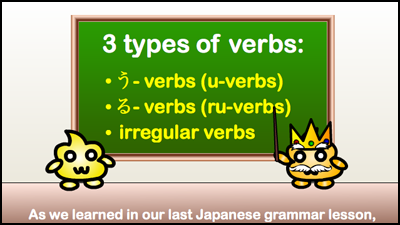
★ We learned last time that there are 3 classes of Japanese verbs:
★ う-verbs (u-verbs)
★ る-verbs (ru-verbs)
★ irregular verbs
………………………………………………………………………………..
Changing う-verbs (u-verbs) to negative
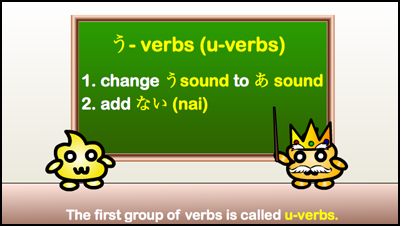
★ The first type of Japanese verbs is called う-verbs (u-verbs).
★ To change an う-verb (u-verb) from affirmative to negative form:
★ change the final う sound (‘u’ sound) to an あ sound (‘a’ sound)
★ add ない (nai) to the end
………………………………………………………………………………..
Note:
★ In the case of a verb that ends in う (u), you have to be a little careful.
★ For verbs ending in う (u) (in other words, they end with two vowels), change う (u) to わ (wa).
★ For example, 洗う (あらう – arau) – to wash – changes to 洗わない (あらわない – arawanai) – to not wash.
★ An exception to the rules is the verb ある (aru) – to exist. The negative form is not あらない (aranai), just ない (nai).
………………………………………………………………………………..

★ 話す(はなす – hanasu) is the plain present affirmative form of the verb meaning “to speak”
★ The negative form of 話す(はなす – hanasu) is 話さない(はなさない – hanasanai) – to not speak.
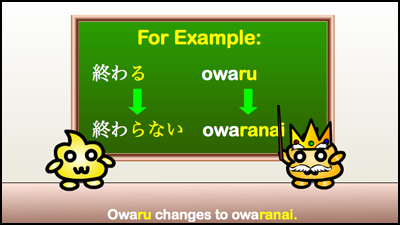
★ 終わる(おわる – owaru) is the plain present affirmative form of the verb meaning “to end”
★ The negative form of 終わる(おわる – owaru) is 終わらない(おわらない – owaranai) – to not end.
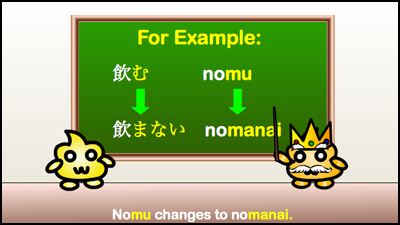
★ 飲む(のむ – nomu) is the plain present affirmative form of the verb meaning “to drink”
★ The negative form of 飲む(のむ – nomu) is 飲まない(のまない – nomanai) – to not drink.
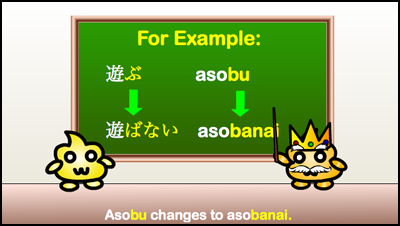
★ 遊ぶ(あそぶ – asobu) is the plain present affirmative form of the verb meaning “to play”
★ The negative form of 遊ぶ(あそぶ – asobu) is 遊ばない(あそばない – asobanai) – to not play.
………………………………………………………………………………..
Changing る-verbs (ru-verbs) to Negative

★ The second type of Japanese verbs is called る-verbs (ru-verbs).
★ To change a る-verb (ru-verb) from affirmative to negative:
★ Take off る (ru)
★ Add ない (nai)
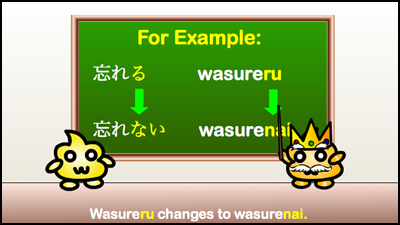
★ 忘れる(わすれる – wasureru) is the plain present affirmative form of the verb meaning “to forget”
★ The negative form of 忘れる(わすれる – wasureru) is 忘れない(わすれない – wasurenai) – to not forget.
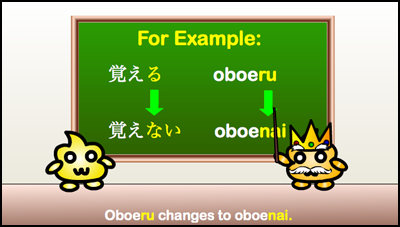
★ 覚える(おぼえる – oboeru) is the plain present affirmative form of the verb meaning “to memorize,” “to learn,” or “to remember.”
★ The negative form of 覚える(おぼえる – oboeru) is 覚えない(おぼえない – oboenai).
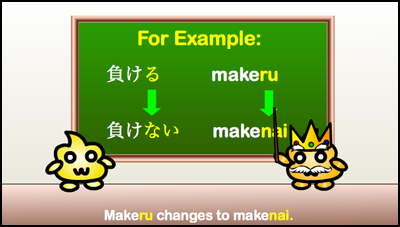
★ 負ける(まける – makeru) is the plain present affirmative form of the verb meaning “to lose”
★ The negative form of 負ける(まける – makeru) is 負けない(まけない – makenai)
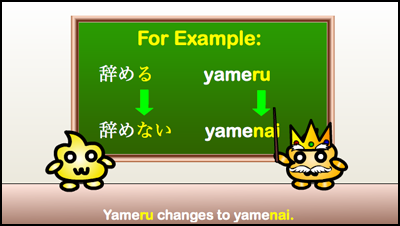
★ 辞める(やめる – yameru) is the plain present affirmative form of the verb meaning “to quit”
★ The negative form of 辞める(やめる – yameru) is 辞めない(やめない – yamenai)
………………………………………………………………………………..
Changing Irregular Verbs to Negative
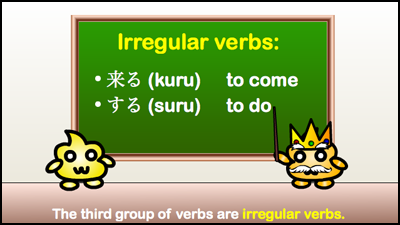
★ There are only 2 irregular verbs in Japanese:
★ 来る(くる – kuru) which means ‘to come’
★ する (suru) which means ‘to do’
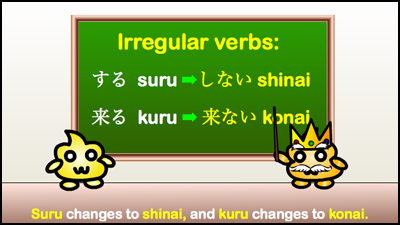
★ 来る (くる – kuru) changes to 来ない(こない – konai) – “to not come”
★ する (suru) changes to しない (shinai) – “to not do”
………………………………………………………………………………..
List of Japanese Verbs in Nai-Form:
………………………………………………………………………………..
List of some common う-verbs in ない – form:
洗わない あらわない arawanai to not wash
歩かない あるかない arukanai to not walk
会わない あわない awanai to not meet
黙らない だまらない damaranai to not be silent
騙さない だまさない damasanai to not trick
選ばない えらばない erabanai to not choose / pick
太らない ふとらない futoranai to not gain weight
頑張らない がんばらない ganbaranai to not do one’s best
入らない はいらない hairanai to not enter
話さない はなさない hanasanai to not speak / talk
払わない はらわない harawanai to not pay
光らない ひからない hikaranai to not shine
行かない いかない ikanai to not go
買わない かわない kawanai to not buy
聞かない きかない kikanai to not listen
守らない まもらない mamoranai to not protect
待たない またない matanai to not wait
持たない もたない motanai to not hold / have
泣かない なかない nakanai to not cry
怒らない おこらない okoranai to not get angry
思わない おもわない omowanai to not think / believe
泳がない およがない oyoganai to not swim
知らない しらない shiranai to not know
立たない たたない tatanai to not stand
使わない つかわない tsukawanai to not use
動かない うごかない ugokanai to not move
歌わない うたわない utawanai to not sing
……………………………………………………………………………….
List of some common る-verbs in ない- form:
開けない あけない akenai to not open
褒めない ほめない homenai to not praise
入れない いれない irenai to not put in
考えない かんがえない kangaenai to not think
借りない かりない karinai to not borrow
片付けない かたづけない katazukenai to not tidy up
数えない かぞえない kazoenai to not count
消えない きえない kienai to not disappear
聞こえない きこえない kikoenai to not hear
答えない こたえない kotaenai to not answer
見ない みない minai to not see / look
見せない みせない misenai to not show
落ちない おちない ochinai to not fall
教えない おしえない oshienai to not teach
捨てない すてない sutenai to not throw away
助けない たすけない tasukenai to not help / save
足りない たりない tarinai to not be enough
疲れない つかれない tsukarenai to not get tired
忘れない わすれない wasurenai to not forget
……………………………………………………………………………….
Example Sentence 1:
お金が足りない。
Okane ga tarinai.
There is not enough money.
……………………………………………………………………………….
Example Sentence 2:
一生忘れない。
Isshō wasurenai.
I won’t ever forget.
……………………………………………………………………………….
Example Sentence 3:
テレビを見ない。
Terebi o minai.
I don’t watch TV.
……………………………………………………………………………….
Want to learn over 600 Japanese verbs and have a quick and easy reference to all of their conjugations?? We recommend the Complete Japanese Verb Guide from Tuttle! ⬇
In addition to being a quick but thorough reference to over 600 verbs and their conjugations, it also includes hundreds of useful example sentences! Get it now!
……………………………………………………………………………….
Next Grammar Lesson:

★ Next time we will learn how to make the Plain Past Affirmative Form of verbs!
……………………………………………………………………………….
Do you want a Japanese tutor?
Take Japanese Skype Lessons with Professional Japanese Teachers on kakehashijapan.com!
………………………………………………………………………………..
………………………………………………………………………………..










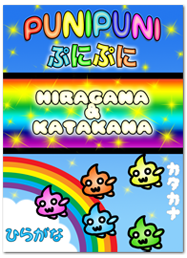
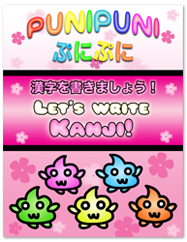


one comment
I love learning new things about the Japanese language! I’ve never been particularly interested in learning the culture of another country, and in reality, all I do is watch anime all day, but I still really appreciate being able to understand what it is that I’m hearing. I hope I can learn more here at PuniPuni.
Comment by Glen756 on 12/02/2014 at 4:08 am